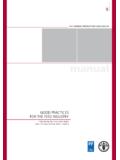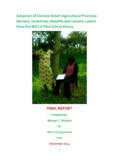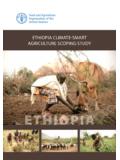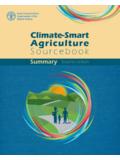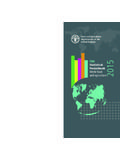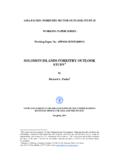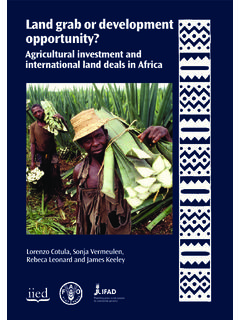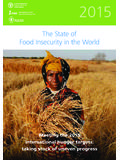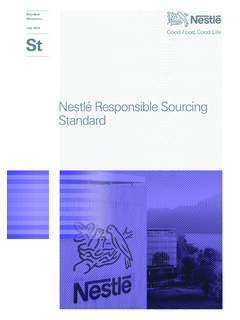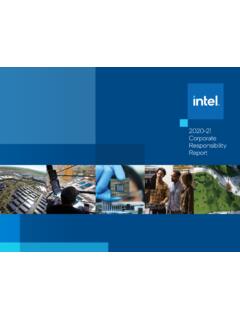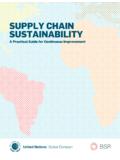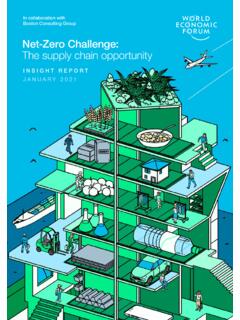Transcription of Model agreement for responsible contract farming: with ...
1 Model agreement for responsible contract farmingwith commentaryModel agreement for responsible contract farmingwith commentaryby Carin Smaller, William Speller and Sarah BrewinPublished by the Food and Agriculture Organization of the United Nations and the International Institute for Sustainable DevelopmentRome, 2018 Required citation: FAO & IISD. 2018. Model agreement for responsible contract farming : with commentary. Rome, FAO. 68 pp. Licence: CC BY-NC-SA IGO. The designations employed and the presentation of material in this information product do not imply the expression of any opinion whatsoever on the part of the Food and Agriculture Organization of the United Nations (FAO) or the International Institute for Sustainable Development (IISD) concerning the legal or development status of any country, territory, city or area or of its authorities, or concerning the delimitation of its frontiers or boundaries.
2 The mention of specific companies or products of manufacturers, whether or not these have been patented, does not imply that these have been endorsed or recommended by FAO or IISD in preference to others of a similar nature that are not mentioned. The views expressed in this information product are those of the author(s) and do not necessarily reflect the views or policies of FAO or 978-92-5-131009-0 (FAO) FAO, 2018 Some rights reserved. This work is made available under the Creative Commons Attribution-NonCommercial-ShareAlike IGO licence (CC BY-NC-SA IGO; ). Under the terms of this licence, this work may be copied, redistributed and adapted for non-commercial purposes, provided that the work is appropriately cited. In any use of this work, there should be no suggestion that FAO endorses any specific organization, products or services.
3 The use of the FAO logo is not permitted. If the work is adapted, then it must be licensed under the same or equivalent Creative Commons licence. If a translation of this work is created, it must include the following disclaimer along with the required citation: This translation was not created by the Food and Agriculture Organization of the United Nations (FAO). FAO is not responsible for the content or accuracy of this translation. The original [Language] edition shall be the authoritative arising under the licence that cannot be settled amicably will be resolved by mediation and arbitration as described in Article 8 of the licence except as otherwise provided herein. The applicable mediation rules will be the mediation rules of the World Intellectual Property Organization and any arbitration will be conducted in accordance with the Arbitration Rules of the United Nations Commission on International Trade Law (UNCITRAL).
4 Third-party materials. Users wishing to reuse material from this work that is attributed to a third party, such as tables, figures or images, are responsible for determining whether permission is needed for that reuse and for obtaining permission from the copyright holder. The risk of claims resulting from infringement of any third-party-owned component in the work rests solely with the , rights and licensing. FAO information products are available on the FAO website ( ) and can be purchased through Requests for commercial use should be submitted via: Queries regarding rights and licensing should be submitted to: cover: iStockContentsAcknowledgements ..ivA. Introduction ..1B. Preparing for negotiations ..4C. The Model agreement .
5 71. The parties ..72. The purpose ..93. The production site ..94. The product ..105. Input provision ..136. Delivery and acceptance ..167. Pricing mechanisms ..188. Force majeure ..219. Remedies ..2210. Duration, renewal and termination ..2411. Dispute resolution ..2612. Signature ..2613. Annexes to support the implementation of the ..28 Annex 1. Model contract : Generic ..29 Annex 2. Model contract : Tomatoes ..40 Annex 3. Model contract : Coffee ..51 References and further reading ..63 AcknowledgementsThe authors would like to thank the following people for their invaluable support and contributions: Nathalie Bernasconi-Osterwalder, Carmen Bullon, Anne Costello, Eva Galves Nogales, Howard Mann, Fr d rique Mestre, Marlo Rankin, Carlos da Silva, Jason Potts, Caterina Pultrone, Teemu Viinikainen and Lee acknowledgement goes to the Swiss Agency for Development and Cooperation (SDC) for the invaluable support to IISD s work on investment in agriculture and water, and to IFAD for supporting this work under the IFAD Grant agreement for the Implementation of the Legal Guide on contract agreement for responsible contract farming : with commentary1A.
6 IntroductionContract farming has existed for decades for many agricultural commodities in most countries. contract farming involves an agreement between the producer and the buyer on terms and conditions for the production and marketing of farm products, usually including the price to be paid, quantity and quality demanded, delivery dates, and sometimes detailed information on inputs and production methods. The more recent growth of contract farming is largely linked to transformations in food and agriculture systems, with increasingly integrated global supply chains. contract farming has gained prominence in the last few years as an alternative business Model to large-scale farmland investments (or land grabs ) that have proven so controversial.
7 Global principles and guidelines for contract farming A number of important global principles and guidelines now exist to help governments, agribusinesses, farmers, and civil society organisations improve the governance of agriculture and food systems (Smaller, 2014b). These include the Voluntary Guidelines on the responsible Governance of Tenure of Land, Forests and Fisheries (VGGT) of the Committee on World Food Security (CFS), the CFS Principles for responsible Investment in Agriculture and Food Systems (CFS-RAI), the OECD-FAO Guidance for responsible Agricultural Supply Chains, and the UNIDROIT/FAO/IFAD Legal Guide on contract farming (the Legal Guide).The UNIDROIT/FAO/IFAD Legal Guide on contract FarmingThe Model is aligned with and draws on the Legal Guide, and offers example language to operationalise the principles elaborated in the Guide.
8 The Model provides simplified Model provisions that can be used and customised by the parties, and which must be adapted to the specific context and legal system. Governments and development agencies interested in promoting contract farming can also use the Model . The Model provides a concise commentary for each provision, but for a more iStockModel agreement for responsible contract farming : with commentary2detailed discussion, users should refer to the Legal Guide, which describes common contract farming terms, discusses the legal issues and problems that commonly arise, and illustrates how these can be addressed in different legal Model agreement for responsible contract farmingThe Model agreement for responsible contract farming is a simple and practical legal tool to support the implementation of global principles and guidelines and make responsible investment a reality.
9 It is designed to address some of the inequalities in contract farming that disadvantage producers; to help create more equitable and sustainable business relationships as well as a transparent business environment for contract farming schemes; and to ensure the producer is paid a fair price for their goods in a timely manner. It can help create strong incentives on both sides to respect the terms of the agreement and build trust between the parties. The Model agreement does not create a one-size-fits-all blueprint; it must be adapted to the realities of the specific commodity, local context and domestic legal system, and supported by each party s independent legal advice. The Model agreement provides generic provisions that are common to most agricultural production contracts and can be adapted.
10 An adaptable word version of the Model agreement is available at To illustrate how the agreement can be adapted for a specific product, two commodity-specific templates have been prepared, one for tomatoes and the other for coffee, available at and Model is for a production agreement between the agricultural producer (the seller, typically an individual producer or a producer organisation) and the buyer (or contractor, typically an agribusiness company engaged in processing or marketing activities).1 The Model is not adapted to livestock production contracts where a farmer raises livestock on behalf of its owner. This type of arrangement is closer in nature to a services agreement rather than a production contract , and requires a number of specific provisions covering issues such as livestock health, veterinary fees, management of manure, and feed quality that are not included in the and benefits of contract farming There are a number of benefits and risks to contract farming for the producer and the buyer.

